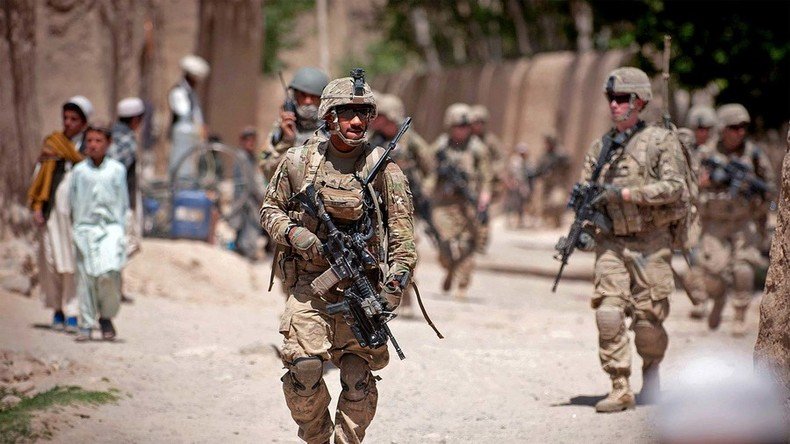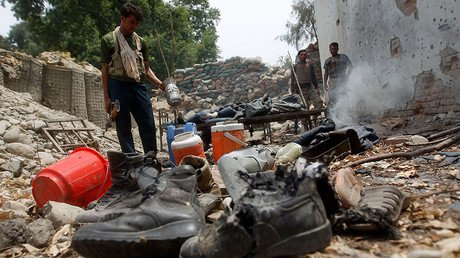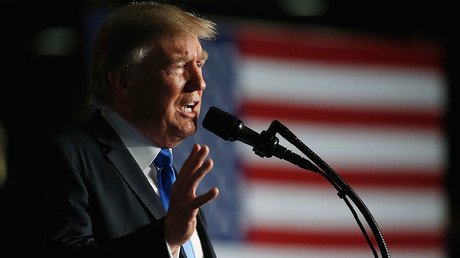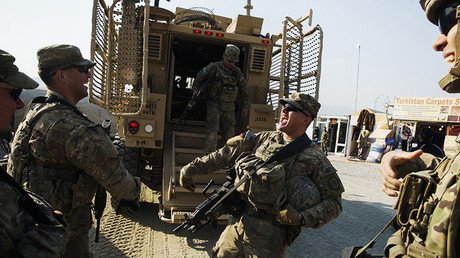No end in sight: Pentagon awards $727mn contract to support Afghan Air Force

The Pentagon has awarded a contract worth over $727 million in support of the Afghan Air Force and Special Mission Wing unit. It comes after Donald Trump’s recent “fight to win” commitment to the nation’s longest war, which has already cost over $780 billion.
“Leidos Innovation Corp., Gaithersburg, Maryland, was awarded a $727,689,796 firm-fixed-price contract to provide support for the Afghan Air Force (AAF) and Special Mission Wing (SMW) helicopter/fixed-wing fleets,” the US Department of Defense said in a statement.
The statement added that bids were “solicited via the Internet with one received. Work will be performed in Kabul, Afghanistan, with an estimated completion date of May 31, 2020.”
Leidos Innovation Corp, a unit of Leidos Holding Corp (LDOS.N), is a major contractor for the Pentagon and the National Security Agency (NSA).
The US Department of Defense has spent over $76 billion on weapons and equipment for Afghan security forces since 2002, the US Government Accountability Office (GAO) said earlier this month.
Washington has paid for 600,000 weapons, including rifles and pistols, for the Afghan Army and police, the GAO report said.
The US has spent more than $780 billion in Afghanistan, according to the National Priorities Project (NPP), in what has become its longest-running conflict, with no clear end in sight. “Every hour, taxpayers in the United States are paying $4 million for cost of war in Afghanistan,” the NPP says.
Last week, President Trump said the US military will “fight to win” in Afghanistan by “killing terrorists,” noting that there will be no “rapid exit” from the 16-year war.
The Taliban is fighting to restore Islamist rule over Afghanistan, which it imposed from 1996 to 2001, when it was the most powerful faction in the country, before being toppled by an American-led invasion.
About 2,400 Americans have died in the war since 2002.
“Our troops will fight to win,” Trump said, however.
“My original instinct was to pull out – and, historically, I like following my instincts,” he went on. “But all my life I've heard that decisions are much different when you sit behind the desk in the Oval Office; in other words, when you're president of the United States.”
“A hasty withdrawal” would create a “vacuum” for terrorists, the US president warned, adding that “9/11, the worst terrorist attack in our history, was planned and directed from Afghanistan because that country was ruled by a government that gave comfort and shelter to terrorists.”
US troops will therefore remain in Afghanistan for an indefinite term, Trump said.
“Conditions on the ground – not arbitrary timetables – will guide our strategy from now on. America’s enemies must never know our plans or believe they can wait us out,” he said.
The US president’s new Afghanistan strategy comes in stark contrast to his previous remarks.
“We should leave Afghanistan immediately. No more wasted lives. If we have to go back in, we go in hard & quick. Rebuild the US first,” Trump tweeted in 2013.
When Trump took office, the Taliban controlled more territory than it did at any time since 2001 and Islamic State terrorists (IS, formerly known as ISIL/ISIS) already had a foothold in eastern Afghanistan.
“We are not winning in Afghanistan right now,” US Defense Secretary James Mattis admitted in June.
From 2001 to mid-2016, around 173,000 civilians in Afghanistan and Pakistan died amid the American-led war, according to the Costs of War Project run by Brown University’s Watson Institute.
More than 183,000 civilians were seriously wounded during that period.
About 8,400 US troops and 6,400 NATO soldiers remain in Afghanistan following the large-scale NATO troop reduction in 2014.
US-led forces entered Afghanistan to end Taliban control more than 15 years ago, following the September 11, 2001 World Trade Center attacks. In an open letter released earlier this month, the Taliban urged Trump to withdraw all US troops from the country.
The Taliban stated in the 1,600-word English-language letter, released to the media through spokesman Zabihullah Mujahid, that experience shows “that sending more troops to Afghanistan will not result in anything.”
The letter accused “warmongering” generals and politicians of prolonging the conflict, adding that the only true path to peace was an end to the American presence in the country.
Russia has recently voiced criticism over the US involvement in Afghanistan. The Russian president’s special envoy to Afghanistan, Zamir Kabulov, said in August that Washington needs to withdraw its troops, adding that the US campaign there “has failed.”
“Afghanistan risks becoming a global incubator of international terrorism. It has, in fact, already partially grown to become it,” Kabulov told Izvestia daily.
















